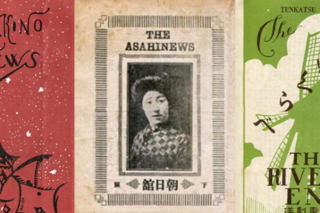Kinema Club Conference for Film and Moving Images from Japan XXIV in Kyoto
Current Perspectives on Gender & Sexuality in Film from Japan
Location: Doshisha University, Karasuma Campus
Organizers: Yuka Kanno (Doshisha University) & Alexander Zahlten (Harvard University)
This conference aims to take stock of the discussion of gender and sexuality with regard to cinema in Japan and to encourage conversations on future directions. Put differently, what possibilities do we have for discussing gender and / or sexuality with and through film and moving images from / in Japan? How has the discussion or conceptualization of gender and/or sexuality changed in film and moving images in Japan? The rise of media studies has led to attempts to go beyond representation, or to structurally tie representation to technologies, infrastructures, or cross-media dynamics such as media mix. Do these approaches offer new perspectives, or do we need to search out a third (fourth, fifth…) way? Similarly, we envision discussing gender and sexuality and their intersection(ality) with other categories in relation to broader cinematic practices, including but not limited to identities and representations.
Friday, August 1
1:30 – 1:45
- Opening Remarks (Yuka Kanno & Alex Zahlten)
1:45– 3:15
Panel 1:
- Diane Lewis (Washington University of St. Louis): “The Marriage Metaphor: Screenwriter Wada Natto and Creative Collaboration”
- Kenta Kato (Meiji University): Approaching the Queer Past: In the Case of Suzuki Seijun’s Ankoku no ryoken
- Christina Nikitin (Harvard University): Sowing the Homofascist Seed: The Messy Politics of Queer Musical Orientalism in Merry Christmas, Mr. Lawrence
- Kawahara Ryuki (Kyoto University): Analyzing Naruse’s 『君と別れて』 『夜毎の夢』 (1933、成瀬巳喜男監督・原作)with DH methodology to analyze gender.
4:30 – 7:30 + Q&A
Screening: Imaizumi Kōichi Works (Imaizumi Koichi in attendance)
(Screening only for conference participants)
Saturday, August 2
9:15 – 10:45
Panel 2:
- Paul Berry (Independent Scholar): Impact of Reevaluation of Shunga on the Sexual Themes Employed in Media Mix Productions found on Netflix Japan
- Ani Maitra (Colgate University): Pornographic (Non-)Relationality and Non-Pornographic Relationality in Koîchi Imaizumi’s Berlin Drifters
- Gyoku Jo 徐玉 (Nagoya Daigaku): 戦後日本映画と女同士の絆
- Lindsay Nelson (Meiji University): Facing Oiwa: Japanese Horror and the Disfigured Female Body
11:00 – 12:30
Panel 3:
- Christophe Thouny (Ritsumeikan University): Object Bodies - Desire, Home and Landscape in Terayama Shūji’s Labyrinth of Grass
- Lucile Druet (Kansai Gaidai University): Contemporary Geisha in Japanese Culture and Moving Images: Towards a New Phase?
- Kanako Tajima (Columbia University): Circuiting Feminist Consciousness: Transnational Belonging and Moving Image in the 1970s
- Shota Uchiyama (Harvard University): Cinema, Affect, and the Female Spectatorship: Revisiting Osaki Midori’s Eiga mansō
2:00 – 3:15
Panel 4: Gendered Narratives in Okinawa’s Environmental Imaginaries
- Sera Toshikazu 世良利和 (Hosei Daigaku): 映画『黒い雪』と沖縄
- Fujiki Kosuke 藤城孝輔 (Okayama University of Science): 映画『オキナワの少年 OKINAWAN BOYS』(1983年)におけるコロニアルな男性性
- Ma Ran (Nagoya University): Into the Depth of Gama—What’s Under Infrastructural Okinawa?
3:45 – 6:30
Screening: Takashi Toshiko, 『Blessed 祝福』+ Q&A
Location: Doshisha University, Clover Hall
Sunday, August 3
9:15 – 10:30
Panel 5: Haunted Screens, Erased Bodies: From Karayuki to Paipan in the Male-Gazed Subgenre of Sexual Victimhood in Japanese War Cinema (1945–2025)
- Dr. Esteban Córdoba-Arroyo (Osaka University): Visualizing Gendered Memory: Postwar Sex Work and the Female Image in Japanese War Cinema (1945–2025)
- Xiaoyang Hao (Kyushu University): Erased Others: Korean and Chinese Ianfu in Japanese Cinema and the Politics of Gendered Memory
- Daniel E. Josephy-Hernández (Ryūtsū Keizai Daigaku / UNED, Costa Rica): Patriotism, Prostitution, and Post-Imperial Memory: The Karayuki-san on Screen
10:45 – 12:15
Roundtable: Rethinking Research on Gender and Sexuality in Japanese Films
Ayako Saito (Meiji Gakuin University), Chika Kinoshita (Kyoto University), Ani Maitra (Colgate University), Arnaud Stockinger (Fellow, Research Institute for Promoting Intercultural Studies, Kobe University)
1:45 – 3:00
Panel 6:
- Alexander Pratt (Kyoto University): A Star is Born in the Media Mix: Unstable Meaning in Kadokawa Haruki’s and Obayashi Nobuhiko’s Idol Films
- Naoto Machida 町田奈緒士 (Nara Women’s University): 日本映画におけるトランス男性・トランスマスキュリン表象の不在
- Daryl Jamieson: Hirokazu Koreeda’s Monster (2023) through the prisms of both contemporary queer theory and medieval Japanese Buddhist philosophy
3:00 – 3:15
Closing Remarks
